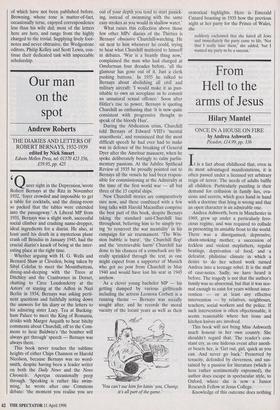Our man on the spot
Andrew Roberts
THE DIARIES AND LEI]. ERS OF ROBERT BERNAYS, 1932-1939 edited by Nick Smart Edwin Mellen Press, tel: 01570 423 356, £59.95, pp. 425
4
ueer sight in the Depression,'wrote Robert Bemays at the Ritz in November 1932, 'foyer crowded and impossible to get a table for cocktails, and the dining-room so packed that the tables were extended into the passageway.' A Liberal MP from 1931, Bernays was a slight snob, successful social climber and crashing name-dropper, ideal ingredients for a diarist. He also, at least until his death in a mysterious plane crash off Brindisi in January 1945, had the crucial diarist's knack of being at the inter- esting place at the right time.
Whether arguing with H. G. Wells and Bernard Shaw at Cliveden, being taken by Sibyl Colefax to meet the Mountbattens, dining-and-sleeping with the Trees at Ditchley and the Cranbornes in Dorset, chatting to Circe Londonderry at the Astors' or staying at the Adlon in Nazi Berlin in 1934, Bernays was asking perti- nent questions and faithfully noting down the answers for his diary or the letters to his admiring sister Lucy. Tea at Bucking- ham Palace to meet the King of Romania, drinks with Margot Asquith to hear bitchy comments about Churchill, off to the Com- mons to hear Baldwin's 'the bomber will always get through' speech — Bernays was always there.
This book never touches the sublime heights of either Chips Channon or Harold Nicolson, because Bemays was no word- smith, despite having been a leader writer on both the Daily News and the News Chronicle. Apergus occasionally peep through. 'Speaking is rather like swim- ming,' he wrote after one Commons debate: 'the moment you realise you are out of your depth you tend to start panick- ing, instead of swimming with the same easy strokes as you would in shallow water.'
What raises this collection above those few other MPs' diaries of the Thirties is Bemays' obsessive Churchill-watching. He sat next to him whenever he could, trying to hear what Churchill muttered to himself in debates. 'War is a beastly thing now,' complained the man who had charged at Omdurman four decades before, 'all the glamour has gone out of it. Just a clerk pushing buttons.' In 1935 he talked to Bernays about abolishing all civil and military aircraft: 'I would make it as pun- ishable to own an aeroplane as to commit an unnatural sexual offence.' Soon after Hitler's rise to power, Bernays is quoting Churchill as enthusing that 'it is now quite consistent with progressive thought to speak of the bloody Hun'.
During the Abdication crisis, Churchill told Bernays of Edward VIII's 'mental anaesthesia', and reminisced that the most difficult speech he had ever had to make was in defence of the breaking of General Dyer after the Amritsar massacre, when he spoke deliberately boringly to calm parlia- mentary passions. At the Jubilee Spithead Review of 1935 he proudly pointed out to Bernays all the vessels he had been respon- sible for commissioning at the Admiralty at the time of the first world war — all but three of the 15 capital ships.
New Churchill stories are comparatively rare now, and these combined with a few long talks with Harold Macmillan comprise the best part of this book, despite Bernays taking the standard anti-Churchill line throughout, believing him to be simply try- ing 'to resurrect the war mentality' in his campaign for air rearmament. 'The Win- ston bubble is burst', 'the Churchill flop' and the 'irretrievable harm' Churchill has done to his chances of a comeback are lib- erally sprinkled through the text, as one might expect from a supporter of Munich who got no post from Churchill in May 1940 and would have lost his seat in 1945 anyhow.
As a clever young bachelor MP — his getting dumped by various girlfriends including the actress Leonora Corbett is a running theme — Bernays was socially sought after, and he records the moral vacuity of the locust years as well as their `You can't sue him for hittin' you, Champ, it's all part of the game.' oratorical highlights. Here is Emerald Cunard boasting in 1935 how the previous night at her party for the Prince of Wales, she
suddenly exclaimed that she hated all Jews and immediately the party came to life. 'Not that I really hate them,' she added, 'but I wanted my party to be a success.'


































































 Previous page
Previous page